Joke, how are you doing today? Has your treatment come to an end?
Joke Peirlinck:“The chemotherapy is indeed over, though I’m still receiving immunotherapy. Overall, I’m doing well. Recently, I’ve even started working a few hours a day again. I’m a quality manager for a supermarket chain, and my employer has allowed me to ease back in with some administrative tasks. I never expected to receive this much support from my company, but my colleagues have been incredibly understanding. That really warms my heart.”

Tell us, how did you first discover you had breast cancer?
“I felt something in my breast after showering, and my gut immediately told me, ‘This isn’t good.’ I’ve always had a lot of glandular tissue and lumps in my breasts, but this felt different. And I was very alert to it because I lost my dad to cancer. Those two weeks leading up to the diagnosis were pure hell. I kept working to distract myself, but it only helped so much. When I finally got the news that the cancer was localized and curable, I could breathe again.”
You were facing quite an intense treatment plan. How did you cope during that time?
“Pretty well, all things considered. I kept exercising during my treatments —probably because I didn’t fully want to admit to myself that I was sick. It didn’t always go smoothly, though. Sometimes I’d feel nauseous after just ten minutes of jogging on the treadmill.
I have two young children, and they gave me the motivation to keep going. I always got up to take them to school. We also explained what was happening to them in an age-appropriate way. My son is very curious and wanted to understand everything in detail. My partner has been a huge source of support too. I know he was often more stressed than he let on, but he tried to shield me from it.”

Staying active while dealing with cancer isn’t easy. How did you manage it?
“I’ve always been sporty. During my treatment, I followed an oncofit program recommended by the breast care nurse. It was run by a physical therapist who guided me personally. I also kept doing strength exercises—just at a slower pace. Moving gently two to three times a week really helped me, especially mentally. I also slowly started swimming again. I took it easy to keep my heart rate under control.
Now, I’ve reached the milestone of swimming 1,000 meters, and it feels like such a victory! If, in a few months, I can start taking dance classes again, I’ll be over the moon. I’ve made peace with the fact that my body has changed due to the treatments. Every time I finish a workout, I mostly just feel incredibly proud.”
You sound like a fighter and an optimist. Did you manage to stay that way the whole time?
“I always try to focus on what is there, yes. On tougher days, I’d lean on the presence of my kids, and I could easily rest on the couch with a good series. The company of my labradoodle also helped so much. When I was napping, she’d often nudge my face with her nose, almost as if to ask, ‘Are you okay?’ I also loved our little walks together in the garden. Even the smallest things can bring comfort.”
Were there other people—or gestures—that helped you through difficult days?
“I was so touched by the mom of my son’s best friend. Without me ever having to ask, she just started helping me with all kinds of things—like cooking a meal and dropping it off at our house. That act of kindness turned into a beautiful friendship.
It’s a good tip for anyone supporting someone with cancer: don’t wait to be asked—just take action. Cook a meal, mow the lawn, go along to an appointment, anything. Most people won’t ask for help themselves.”

You went back to work quite quickly. Was that your own decision?
“After finishing my chemo, I was already hinting to my doctor, asking when I could return to work. They told me, ‘End of April.’ But by January, I was already feeling restless (laughs). So in consultation with my workplace, I started earlier—just a few hours a day, working from home. I’m not yet joining the usual meeting marathons my job involves—that would be too exhausting. And I don’t plan to return full-time either.”
Has your perspective on work—and life—changed since your cancer diagnosis?
“I’ve decided that from now on, Wednesday afternoons are just for my kids. I also want to make a little more time for myself: going to a yoga class with a friend, hiring a babysitter so my partner and I can go out for dinner. I’ve noticed that this whole experience has made me more patient. I can’t get upset about every little thing anymore. I’m slowly finding my way back into life, with a few small adjustments. Of course, there are still worries about recurrence, but I don’t want fear to take over. It’s important to follow your own path—to focus on the bright spots and not get swept away by the negative stories that circulate about cancer.”
How was it to participate in the Rosette La Vedette photoshoot as a “model for a day”?
“I didn’t hesitate for a second to take part! I already knew Rosette la Vedette's chemo hats and wore them all the time. I had different prints, and people always complimented me on them—which worked wonders for my confidence. The shoot itself was such a fun day! Everyone was cheerful, and the final result turned out beautifully. For me, it felt like a way to give back: to show other (younger) women that they’re not alone. I certainly never expected to be confronted with cancer at just 36. I think that sense of recognition can be so healing.”
[Photos: Fall 2023 – Interview: Spring 2024]
Would you love to experience a photoshoot like this with a professional photographer, stylist, and makeup artist? Follow us on Facebook and Instagram. We’re always on the lookout for new “models for a day” for our campaigns!

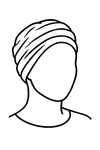
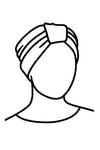
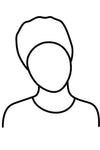
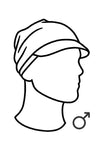
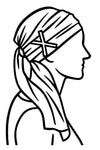
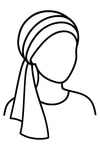
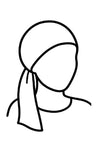
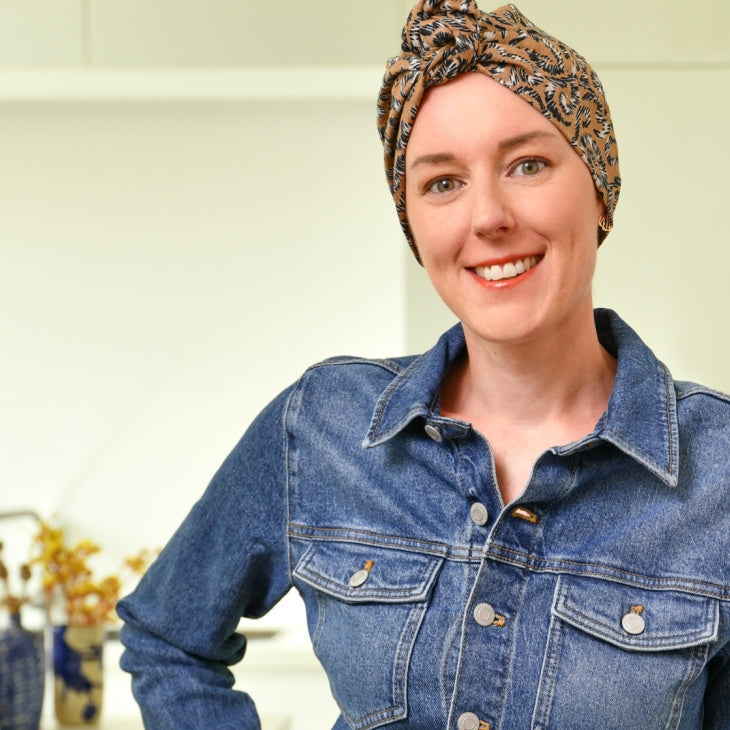
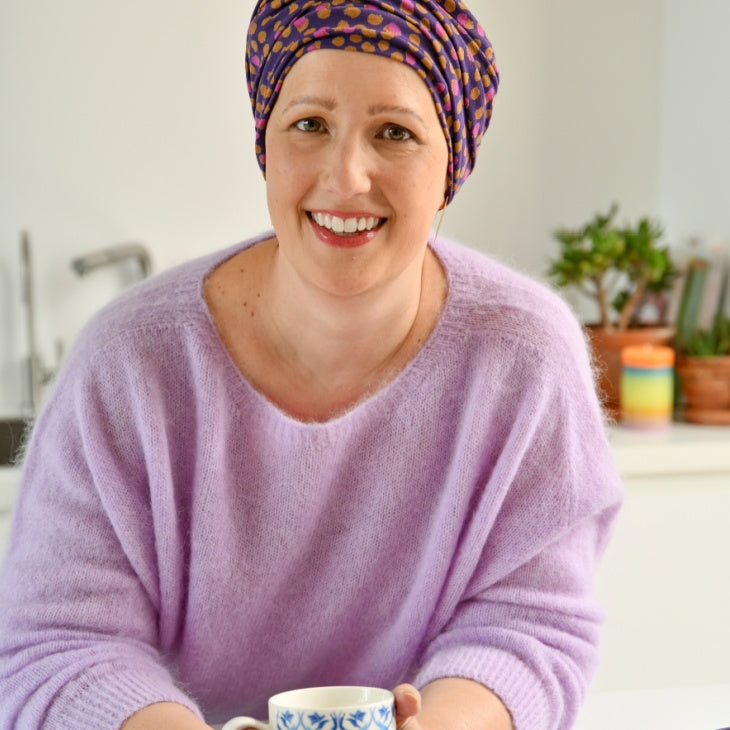
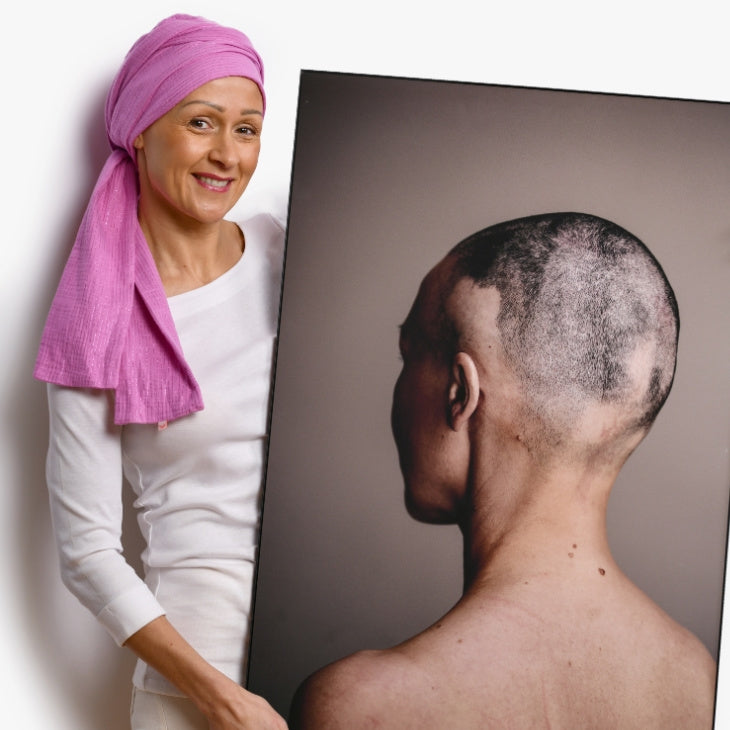
Leave a comment
All comments are moderated before being published.
This site is protected by hCaptcha and the hCaptcha Privacy Policy and Terms of Service apply.